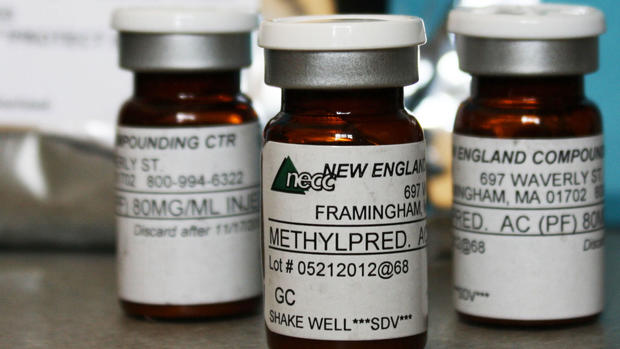Fungal meningitis outbreak claims 24th victim
A twenty-fourth person has died of fungal meningitis, the Centers for Disease Control and Prevention reported Wednesday. An Indiana resident died from the outbreak tied to contaminated steroid injections from the New England Compounding Center.
As of Oct. 24, there are 317 reported infections tied to the outbreak in 17 states. The previous day there had been 308 infections including 23 deaths.
The current count mostly includes patients with fungal meningitis who received methylprednisolone acetate steroid injections -- many for back pain -- but five cases are peripheral joint infections from those who received the shots in areas such as the knee, hip, shoulder or elbow. No deaths have been associated with peripheral joint infections.
The outbreak stems from lots of contaminated preservative-free methylprednisolone acetate steroid injections made by the New England Compounding Center of Framingham, Mass. that up to 14,000 patients received for pain treatments in 23 states.
The injections shipped to 76 facilities in states including: California, Connecticut, Florida, Georgia, Idaho, Illinois, Indiana, Maryland, Michigan, Minnesota, North Carolina, New Hampshire, New Jersey, Nevada, New York, Ohio, Pennsylvania, Rhode Island, South Carolina, Tennessee, Virginia, Texas and West Virginia.
Mass.Gov. Deval Patrick said Tuesday the state has moved to revoke the license of the New England Compounding Center and three pharmacists.
On Tuesday results of a preliminary investigation also revealed unsanitary conditions and questionable practices at the New England Compounding Center.
The Framingham, Mass. facility was found to have dirty floor mats and a leaky boiler and black fungus specs in steroid vials, among complaints.
The company also shipped vials from contaminated steroid lots before first testing the vials for safety, officials said. However, once the tests came back they showed the vials that were tested were clean, officials said.
According to Massachusetts law, compounding pharmacies must have a prescription for every patient for each dose they send out. More than 17,000 vials of the suspect steroid went to clinics in 23 states. However, documents released Monday show that complaints against NECC for lack of individual prescriptions date back to 1999.
"It has always been the company's practice to provide the Board with full and complete access to its facility and its records. As is standard practice in the health care industry, the Board had numerous opportunities, including as recently as last summer, to make first-hand observations of the NECC's facilities and operations," NECC said in an emailed statement to CBS News yesterday. "Based on that history, it is hard to imagine that the Board has not been fully apprised of both the manner and scale of the company's operations."
- Company to lose license over meningitis outbreak
- 16-year-old Ind. girl may be youngest meningitis victim
- Black fungus specks in vials among complaints at New England Compounding Center
Last week, the Food and Drug Administration confirmed the fungus found in at least 40 people sickened with fungal meningitis -- called Exserohilum rostratum -- was also found in more than 50 unopened vials from one of the recalled lots.
Exserohilum is common in the environment, but rarely causes illness and has never before been identified as a cause of meningitis, according to CDC officials.
Ninety-seven percent of the 14,000 patients who received injections from the implicated lots of steroids have been contacted for follow-up, according to the CDC. The agency still urges people who have been contacted of their risk to look for new symptoms, since fungal meningitis may take weeks to develop.
